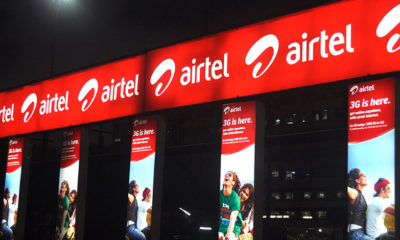Airtel Africa, one of Africa’s leading telecommunications companies, grew revenue by 13.0% to $1,257 million in the first half of 2022.
The company disclosed this in its unaudited financial statement released last week and accessed by Investors King.
According to the company, total revenues (both for mobile services and mobile money services combined) rose by 18.3% in Nigeria, 14.1% in East Africa and 11.7% in Francophone Africa.
Airtel recorded revenue growth in constant currency across all four operating regions.
For instance for Mobile Services revenue, the company reported 18.3% growth in Nigeria, 11.1% in East Africa and 10.6% in Francophone Africa (and across the Group by 14.2%, with voice revenue up by 11.3% and data revenue up by 19.8%).
Mobile Money revenue grew by 26.5%, driven by growth of 26.9% in East Africa and 25.4% in Francophone Africa.
The company’s total customer base increased by 8.9% to 131.6 million with increased penetration across mobile data (customer base up 9.7%) and mobile money services (customer base up 19.7%).
Operating free cash flow grew by 10.3% to $473m, while net cash generated from operating activities reduced by 13.2% to $388m, mainly due to increased cash tax payments from both higher taxes on declared dividends and increased taxable profits.
Earnings before interest, taxes, depreciation, and amortization (EBITDA) grew by 14.9% to $614m in reported currency. EBITDA margin was 48.8%, an increase of 78 basis points in reported currency and 52 basis points in constant currency.
The company’s operating profit grew by 20.6% to $425m in reported currency while profit after tax grew by 25.3% to $178m.
Segun Ogunsanya, chief executive officer, on the trading update: “I am pleased to report that the Group has continued to post double-digit revenue growth, margin improvement and strong earnings growth. I am also particularly pleased with our ongoing strengthening of the balance sheet which continued after the period ended, with early repayment of $450m of debt at Group level.
“As we flagged in our full year announcement, this quarter we have faced headwinds from outbound voice call barring for customers who had not yet registered their National Identification Numbers in Nigeria and the loss of site sharing revenue in those OpCos where we recently sold towers. Inflation is also having an impact on our cost base, particularly on energy costs, but our continued efficiency drives have ensured that we have still been able to increase our margins, albeit at a slightly slower rate.
“After receiving the Payment Service Bank licence in Nigeria just a few months ago, it is a testament to our prior preparation that we have already managed to launch our mobile money operations in a few select locations without any operational issues. We are excited by the commercial developments and opportunities here. We also continued to invest for growth and have made a couple of major additional spectrum acquisitions recently in the DRC and Kenya in anticipation of continued strong data demand growth in these markets.
“We continue to target growth ahead of the marketthis year and, despite inflationary pressures, our continued focus on cost efficiencies should also support margin resilience. Longer term, the opportunities for sustainable profitable growth stemming from our underpenetrated markets for each of mobile voice, data and mobile money services remain hugely attractive, and we are confident of continuing to deliver on our growth strategy.”


 Naira4 weeks ago
Naira4 weeks ago
 Naira4 weeks ago
Naira4 weeks ago
 Travel3 weeks ago
Travel3 weeks ago
 Jobs4 weeks ago
Jobs4 weeks ago
 Naira3 weeks ago
Naira3 weeks ago
 Naira3 weeks ago
Naira3 weeks ago
 Investment4 weeks ago
Investment4 weeks ago
 Travel4 weeks ago
Travel4 weeks ago


















